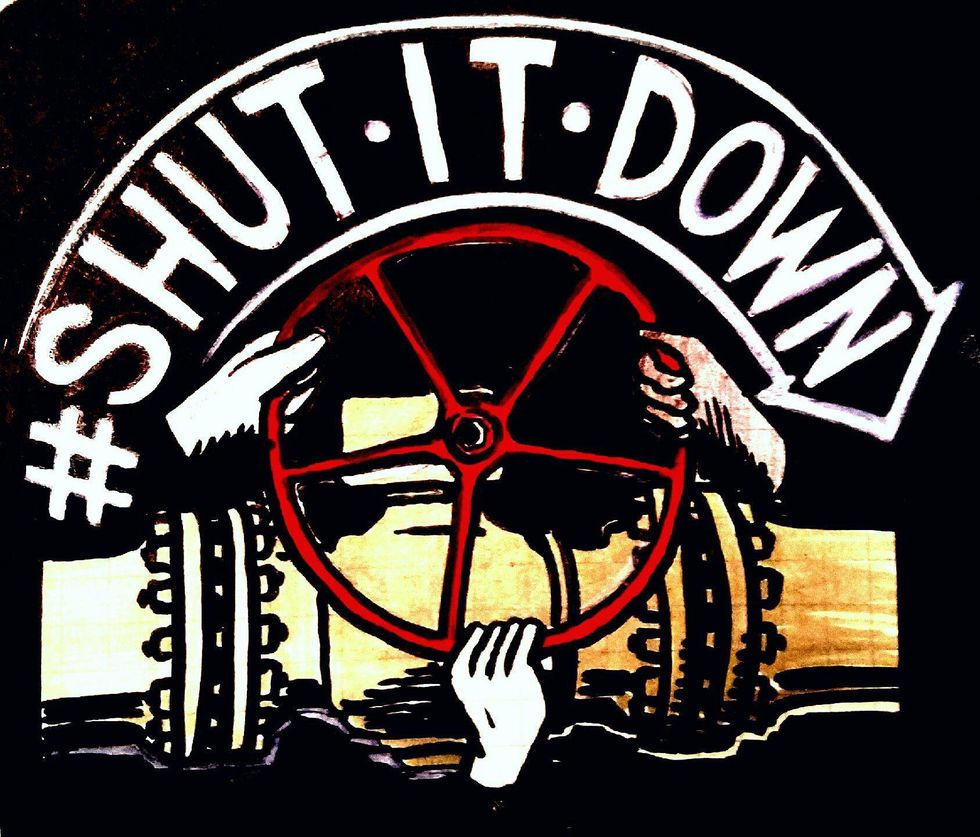"You may have heard the Valve Turners called criminals...anyone who stands to protect Mother Earth, I call them heroes."
So spoke Anna, a member of the Puyallup tribe, as she introduced the men and women who committed a decisive act of civil disobedience (non-violent direct action that involves law-breaking), for which they now face up to 51 years in prison.
On October 11, 2016, a small group of citizens--five of whom are now seated at a panel in front of me--responded to the Standing Rock Sioux's call for a day of action and prayer by temporarily shutting down some of the major pipelines that pump crude oil from Canada into the United States. They called the energy companies responsible for the pipelines located in Minnesota, North Dakota, Montana, and Washington state, alerting the companies that they would be turning off emergency shut-off valves for the pipelines. The companies were then forced to halt their flows of the crude oil until the valves could be re-opened. This delay meant that the Valve Turners' actions reduced the total amount of crude oil that entered the United States by 15% on that day.
Emily Johnston, Leonard Higgens, Michael Foster, Ben Joldersma, and Sam Jessup spoke calmly and clearly about their shared commitment to fighting for environmental justice, defined as “the fair treatment and meaningful involvement of all people regardless of race, color, national origin, or income with respect to the development, implementation, and enforcement of environmental laws, regulations, and policies.”
Emily articulates her understanding of her obligation to utilize her privilege as a white, middle-class, cisgender woman to fight for disadvantaged individuals most vulnerable to the harms of climate change, fossil fuel extraction, and mineral mining. “I felt it was our responsibility [to take direct action] because we pay a lower price…the people who suffer first and worst from environmental damage…are usually the least responsible.”
Michael expresses his concern that ongoing abuse of fossil fuel combustion to power our world presents today's children and future generations with a substantial burden to address, saying, "Environmental injustices are a crime against our kids and their futures."
When asked what role they believed civil disobedience plays in addressing environmental concerns, everyone agrees that it cannot be the only method of affecting change. Emily tells of her daily efforts to contact legislators while Michael discusses his role in providing education about the science behind environmental phenomena. Leonard states that “civil disobedience is not a replacement for all the work going on," but is rather an essential supplement in building political will. Emily adds that "direct action is the only thing that has ever affected social change" and her belief that such action signals a "withdraw[al] of our implied consent of fossil fuels [that are] destroying our world."
She cites Martin Luther King's quotation as her rationale for civil disobedience: “An individual who breaks a law that conscience tells him is unjust, and who willingly accepts the penalty of imprisonment in order to arouse the conscience of the community over its injustice, is, in reality, expressing the highest respect for law.”
This idea that our actions, made from a place of genuine commitment to justice, compassion, and respect, can "arouse the conscience of the community" seems profoundly important to me. We are all incredibly caught up in our own lives, and from an evolutionary standpoint, this makes total sense: prioritizing our own safety and well-being, we are better equipped to be attentive to danger, to survive, and to reproduce.
But the beautiful network of empathy and caring that weaves us together demands that we be attentive to the plights of fellow humanity and cognizant of the role we play in causing, acquiescing to, or combatting their suffering. And direct action--taken in consultation with the groups for whom we seek to aid by our action--seems to me to be a way in gently pulling at those threads, those common ties.
Civil disobedience is a high-stakes matter, as the long sentences and substantial legal fines that the Valve Turners have amassed can attest. Emily mentioned that, as mostly retired persons, the Valve Turners did not have to deal with the consequences of felony charges appearing on their records/job applications, but that young citizens participating in direct action may not have that same luxury. There may be very real monetary and opportunity losses.
But, as David Bean, an activist from the Puyallup tribe so poignotanly asked, "What would you do if your Mother was under attack?" What if our commitment to Mother Earth--to our home, to the source of all life past, present, and future--demanded action at a faster pace than legal systems and legislative change can obtain?
Then maybe accepting the risk of orange prison attire may be necessary in keeping our world green.






 The minimum wage is not a living wage.
StableDiffusion
The minimum wage is not a living wage.
StableDiffusion
 influential nations
StableDiffusion
influential nations
StableDiffusion












